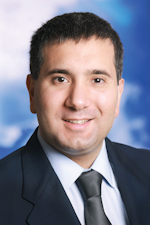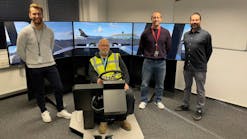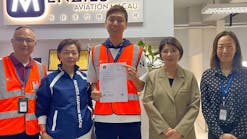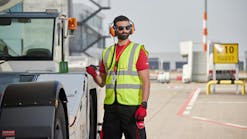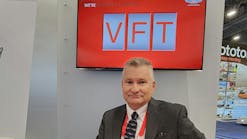Professionalism’s Value to Africa’s Ground Handlers
Professionalism, in general, is a good business practice. In a time-constrained and safety-sensitive industry such as aircraft ground handling, professionalism has strategic importance.
In general, professionalism entails several interconnected traits that include:
- A positive attitude
- Safety consciousness
- Knowledge of handling procedures and the airport environment
- Familiarity with the IATA Ground Operations Manual (IGOM) and Airport Handling Manual (AHM)
- Attention to detail
- Quick response to emergencies
“The list is non-exhaustive, but a combination of these is crucial in realizing professionalism in the aircraft ground handling environment,” say Fred Kiige, regional manager of East Africa at UAS International Trip Support, and Abdul Oricha, UAS’ regional operations manager of Africa.
“It is important to be able to execute the handling in a safe manner, to make sure that aircraft handlers understand that all the services are clearly defined and that they make it clear to the people that are involved in the operation,” adds Henry ‘Duke’ LeDuc, regional operations manager at UAS. “It is also important to make sure that there is clear communication and understanding of both the operating requirements and the regulations on the field.”
Qualification of Handlers
At UAS, vendors of aircraft ground handling services go through a qualification before being placed on the list of preferred handlers at all UAS locations.
“A physical audit of their capabilities, GSE and records is carried out at their location during the handling of a live flight. Their track record is analyzed from authentic, locally available information and confirmed before they can be engaged. International certifications like ISAGO (IATA Safety Audit for Ground Operations) are some of the priorities for qualification,” say Kiige and Oricha. “During normal operations, UAS station managers keep a keen eye on activities to observe the level and quality of service. Any non-conformity noted is shared with the handler for corrective action or reconsideration.”
According to LeDuc, in Africa there is a big disparity from one country to another in relation to the level of training and of service that is available.
“It is important for anybody who is going to be operating in Africa to have somebody who is familiar with operations on the field and who is going to be capable of supervising, such as a supervisory agent to work alongside local operatives to make sure that they get the quality and consistent delivery of services as expected,” he says. “It really varies very widely between individual countries and it is important to note that several countries have monopolies and government run facilities, which may make it hard to have the equipment and personnel standard in place to be able to deliver.”
UAS has supervisory agents located throughout Africa.
“We are familiar with each of these countries’ operations and we have got contacts and the ability to help facilitate these types of operations. They basically will go to the location, assuming that they are not already there, and they will work with the ground handler to ensure that everything is in place, so that the operator that goes there and uses local suppliers had a good consistent delivery of services,” says LeDuc.
Best Practices
Kiige and Oricha believe that human resource (HR) departments at ground handling service providers should enforce a set of practices to support professionalism in the workforce, these include:
- Encouraging dialogue and consultation within the workforce as opposed to top-down escalation of orders
- Ensuring workplace rules and regulations are well documented and understood by the workforce by making them easily available and accessible
- Providing training and accessibility to self-development protocols. This will motivate staff and ensure they are up to date with the best practices
- Regular and recurrent training in handling procedures. These are continuously updated by IATA and staff need to be up to date
- Regular and recurrent training in safety and security awareness. Dangerous Goods Category 6 certification is a must for all ground handling staff and must be renewed every two years
- Displaying the company goals and objectives clearly in areas where all staff can see and internalize them
- Establishing a system to provide feedback to staff on issues that may be of concern to them
- Adopting corrective, rather than punitive, measures in dealing with incidents and accidents
An HR-related example at UAS is its Shining Star initiative that was created to encourage professionalism and innovation.
“Through the initiative, employees could submit their ideas and innovations on procedure at UAS by explaining how a new process could enhance quality, efficiency and performance. The finalists were then chosen and could present their ideas to executive management. The initiative proved to be remarkably popular with employees as it gave them the opportunity to have their ideas implemented – it benefited the entire organization,” say Kiige and Oricha.
UAS has worked with various handlers in Africa to help them establish and develop training systems within their operations.
“International operators operating to their locations want to make sure that there are standards in place such as IS-BAH (International Standard for Business Aircraft Handling), so that they can have a standard that they can train to internally. It is important for the handlers to really be committed to the training that they deliver, because, although it is an investment that they make and that they may not see an immediate return on, they are going to see it over time as they are going to increase the value that they provide in the business,” says LeDuc.
Career Prospects
Having a career prospect is important to support professionalism in aircraft ground handling as it gives individuals something to be vested in.
“If they develop themselves, if they believe they have an understanding that they can make themselves better, if they have open opportunities to grow within the organization, all this plays an incredibly important role in keeping the team engaged,” explains LeDuc. “If they understand what the parameters are to move on to the next level, it gives them the opportunity to enjoy what they do and have the desire to be able to move higher up.”
The ground handling company should detect an operative’s interest to grow and it should encourage the person by placing at their disposal reference material for them to learn basics of the industry.
“The company should train and place them under the guidance of well-established ground handling staff who should walk the journey with them and encourage them to grow. The company should encourage structured goal setting and provide motivational awards or rewards whenever a staff member attains their development targets. This could be in form of a promotion or extra responsibilities or/and even monetary,” say Kiige and Oricha.
It is well known that the aircraft ground handling industry has high turnover almost anywhere, however, according to LeDuc, there are things that management can do to control the turnover, such as empowering the team to identify ways to improve.
“One of the things that we found is very helpful is to have an internal safety council that finds potential issues with processes and it is only made up of the frontline individuals and of the first line supervisors that work with the aircraft,” LeDuc says. “When one realizes that there are more opportunities to be able to make changes, they are more engaged, and they also feel like they made a difference. They are also the ones who come up with a lot of the best ideas.”
Role of Safety
In ground handling safety plays a significant role at all levels.
“Any safety lapse can cause the loss of the entire business while a good safety record is a magnet for customers and investors. Most importantly, a safety lapse can cause the loss of lives. Companies must reinforce safety awareness by ensuring mandatory periodical safety training and a monitoring system that ensures every staff member is trained at the appropriate time,” say Kiige and Oricha.
“There must also be a system to ensure the quality and standard of the training conforms with the industry recommendation,” they continue. “The company needs to develop a safety culture among staff so that it becomes part of their psyche and a guiding light to everything they do. This way the company develops a professional workforce.”
Safety awareness can be reinforced as part of personal development.
“Safety is about having the understanding of the whole team engaged and not just having a safety officer and a group of people that are watching out for the safety officer. Safety awareness is to be incorporated into all of the processes. Everybody has got to feel like they have got to invest interest into ensuring that things go right from the very top. It is important to have a combination of the means of reporting and of rewards to encourage people to be involved in the safety process,” says LeDuc.
“The UAS Africa team has a robust safety awareness program where members of the team are tasked with ensuring the entire team is continuously up to date with safety regulations and guidelines provided in the company SOP. Safety seminars are conducted regularly through various means ensuring the team understands the importance of the training and how to effectively react in a live situation,” say Kiige and Oricha.
“During operations, our station managers are always mandated to wear personal protective equipment (PPE) provided by the company and to ensure the handler staff use the same,” they add. “High visibility jackets, safety shoes, gloves for equipment operators and baggage handlers are mandatory for all staff on ramp during our operations.”

